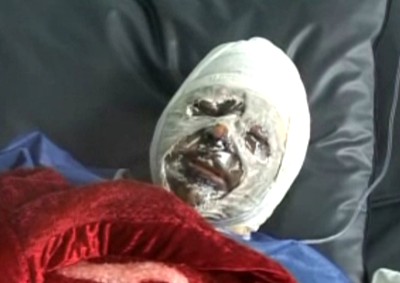Habibullah Sherzai
PU-I-KHUMRI: Department of Women's Affair in Baghlan province reports a worrisome increase in the scale of violence against women, including murder and suicide, this year as compared to the previous year.

Self-immolation among Afghan women have been increased in alarming rate.
With heightened concern, the department says up to 74 cases of violence were recorded since the beginning of this year, against last year's 67 cases.
Department's human rights director, Afghan Gul, told Pajhwok that this year's violence cases included 6 murders, 3 suicides, 10 runaways, 10 food deprivations, 8 forced marriages, 7 engagements breakdowns, and several other cases of physical abuse.
According to Gul, out of last year's 99 violence-related cases, 25 were about runaways, the rest included murder and suicide.
Gul also added it was most likely that more such cases could exist because most of the files were directly referred from the criminal department to the attorney's office.
"Most women are highly concerned about the increase of the violence against them, in particular murder, and seek punishment to the perpetrators," he said.
A 45-year-old Nasrin says: "A month and a half ago, my son-in-law brutally stabbed my daughter several times and killed her inside our house on a broad daylight."
The woman explains that her 21-year-old daughter (Mouloda) had come to their house to see her father. "The son-in-law followed her to our house wanting to talk to his wife in the other room. After a few minutes, her daughter's screams were heard, and when they entered the room, and found the son-in-law holding a bloody knife, who immediately ran out of the house."
In tears, the victim's mother added: "When we entered the room, we found Mouloda lying there in a pool of blood. We then took her to a hospital in our arms; the doctor told us that she is no more."
Nasrin says that her daughter had been married for about two months, and does not know why a man would kill his wife in such a violent and barbaric way.
The mother further expressed that 'if her daughter had any faults, her husband could simply divorce her, rather than stabbing her with a knife.'
She said that the government should punish the murderer publicly for the crime he had committed, so that people can learn not to behave in such a ruthless manner with women.
Police say that Mouloda's husband Abdulhadi, 28, a resident of Dand-e-Ghori, Pulekhumri city, has been detained.
Baghlan's crime branch police chief, Samonwal Habibul Rahman Afzali, said Abdulhadi's case, charged with murder of his wife, had been referred to the provincial attorney's office.
Fatima, 48, a resident of Du-Saraka, Polekhumri, says that one of the occurred murder cases of such nature is of an 18-year-old Razia, a student of Madan High School.
She claims that Razia was shot dead by her brother in her own house, and to this day the reason for the murder is unknown.
Fatima says that the types of problems affecting them now, such as brutal murders and the lack of follow ups, did not exist during the Taliban's rule.
Abdulqadir, head of the provincial appellate court, says the Marzia's brother has been at large, and that her father has been charged and detained for the crime, since he was present at the house when the murder took place. The search and investigations for the real killer, however, still continues, although the victim's detained father insists that the murder committed by his 25-year-old son only.
The victim's father said: "My daughter used to talk on the phone to different people, would not listen to our advice, and had gone out of control. This is why my son killed her!"
Zaidullah Paiwand, head of the Independent Human Rights Commission, northeastern zone, condemns all forms of violence against mankind including against women. He says that there are several factors contributing to the rise in violence against women.
He added the laxity on the part of justice sources, increased corruption, existence of illegal armed groups, as well as a weekend government law enforcement system were the main contributors to such incidents. He said their commission was greatly concerned about the deteriorating situation.
Paiwand said the provincial should seriously work towards the prevention and elimination of incidents of violence against women, as well as the arrest and persecution of the perpetrators.
However, head of the provincial appellate court, Abdul Qadir, said that so far more than 10 people had been detained and about 10 more were under investigation by the judicial sectors in relations to such crimes.
According to him, in less than two months, four intentional murder cases, four suicidal cases, and 10 cases of physical abuse were referred to the provincial attorney's office.
He added one of the cases was of female violence against another female. A woman by the name of Gul Shah had severely beaten her brother's wife, Zarnegar.
He said that the cause for the increase of such types of violence, include lack of legal awareness, family neglect, certain traditions, as well as early marriages.
Although the Afghan independent Human Rights Commission has not published a specific number of cases of violence against women during this year, but based on the commission's information more than 2,000 such cases were recorded in 2008.



